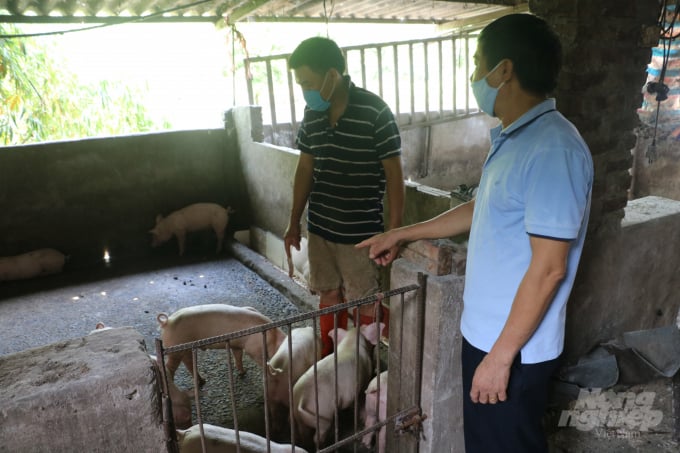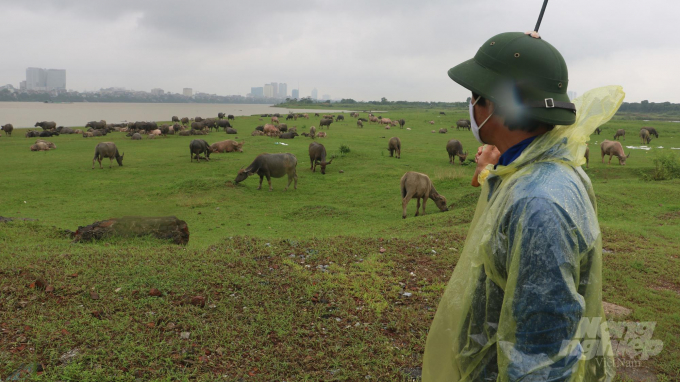June 4, 2025 | 20:12 GMT +7
June 4, 2025 | 20:12 GMT +7
Hotline: 0913.378.918
June 4, 2025 | 20:12 GMT +7
Hotline: 0913.378.918

People are not allowed to raise livestock in the inner city according to a regulation promulgated by Hanoi’s People’s Council. Photo: Hng Giang.
A ban on small-scale livestock breeding in urban areas not only helps reduce environmental pollution, prevent epidemic diseases but also creates a driving force for large-scale and more sustainable development, the city authority has said.
The Hanoi People's Council recently has passed Resolution 02 identifying areas in the city that are not allowed to raise livestock and promulgating policies to support the relocation of livestock facilities out of such urban areas.
Accordingly, the council names areas that are not allowed to raise cattle and poultry (except ornamental species and animals used for scientific experiments without causing environmental pollution) including all wards of the districts inside the city, four wards of the outskirt Sơn Tây Town, and five others in the districts of Dan Phuong, Hoai Duc, Dong Anh, Gia Lam and Thanh Tri..
The city’s resolution has also assigned communal and district authorities to issue a ban on livestock breeding in old apartment buildings and dormitory blocs in local urban areas.
Nguyen Ngoc Son, Director of the Department of Livestock and Animal Health in Hanoi, said the law has stated that residential areas are not allowed for small-scale livestock breeding.
“Hanoi is now pursuing very fast urbanisation. The small-scale and scattered husbandry is causing huge environmental pollution while not bringing in high economic efficiency,” he said.
Son also warned about the danger of epidemics saying that the risk of spreading diseases was very large.

In some areas by the Red River in the inner-city districts, livestock breeding is also not allowed. Photo: Hung Giang.
He said according to the veterinary agency, there were over 100 diseases related to human health that can be transmitted from livestock such as rabies, streptococcal, foot-and-mouth disease, influenza A H5N1 and H7N9.
Hanoi has issued policies supporting livestock breeding households in urban areas to change to other models of agricultural production by providing them with loans and cultivating areas.
The city has also set up new large-scale concentrated breeding areas will be located in localities such as Ba Vi, Soc Son, Me Linh, Thach That, Quoc Oai and Chuong My.
“This is a great development orientation of Hanoi. Reducing small-scale husbandry and opening more concentrated husbandry areas will help supply for 10 million of the people of Hanoi at the same time ensure food safety,” Son said.
The city authority official stressed that only large-scale husbandry with investment in the application of high technology and chain linkages can help boost food safety and procession for export.
Currently, the whole city has more than 200,000 units and households raising cattle and poultry such as chicken, ducks, buffalos, cows, pigs and goats.

Hanoi livestock breeders will be supported with loans and lands to change to other suitable careers after the prohibition of livestock breeding in the city. Photo: Hung Giang.
There are now more than 200,000 cattle and poultry being rased in more than 3,000 farms and agricultural households in the areas which have been proposed to give a ban on livestock breeding.
Author: Tran Ho - Hung Giang. Translated by To Nhu. Edited by Duc Huy.

(VAN) VAAS and numerous Vietnamese enterprises have signed cooperation agreements with Japanese partners to promote agricultural technology and trade connectivity.
/2025/05/29/5625-12-214801_567.jpg)
(VAN) Provincial mergers in the Mekong Delta promise to streamline administration, expand inter-provincial raw material areas, and foster close linkages in agricultural value chains, benefiting both businesses and cooperatives.

(VAN) Merging Mekong Delta provinces contributes to the expansion of agricultural raw material areas, addressing previous constraints caused by provincial boundaries. Additionally, this expansion will reduce costs and strengthen linkages between businesses, cooperatives, and farmers.
/2025/05/29/1043-2-153730_145.jpg)
(VAN) The Government's policy to merge provincial-level administrative units opens up major opportunities for the Mekong Delta region to reshape its agricultural development strategy toward large-scale production, effective regional linkages, and sustainability.

(VAN) The mutual export of agrifood products between the European Union (EU) and the United Kingdom (UK) must occur again without certification, border controls or other red tape. This was agreed at the UK-EU summit.
/2025/05/22/5121-2-173645_677.jpg)
(VAN) NBSAP Tracker identifies strengths and areas for improvement in the National Biodiversity Strategy, based on each region’s priorities and capacities.

(VAN) The draft amendment to the Circular on rice export trading stipulates a periodic reporting regime for rice exporting enterprises.